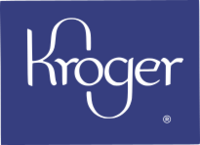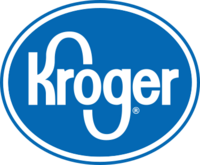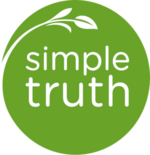Kroger facts for kids
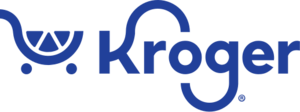
Logo since 2021
|
|
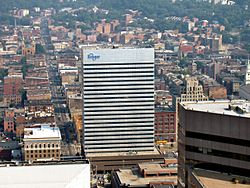
Kroger headquarters in Cincinnati
|
|
| Public | |
| Traded as | |
| ISIN | [https://isin.toolforge.org/?language=en&isin=US5010441013 US5010441013] |
| Industry | Retail |
| Founded | 1883, in Cincinnati, Ohio, U.S. |
| Founder | Bernard Kroger |
| Headquarters | 1014 Vine Street,
Cincinnati, Ohio, U.S.
|
|
Number of locations
|
2,719 supermarkets (Q1 2023) |
|
Area served
|
United States |
|
Key people
|
Ron Sargent (CEO (interim) & chairman) |
| Products | Supercenter/superstore, Other specialty, supermarket |
| Revenue | |
|
Operating income
|
|
| Total assets | |
| Total equity | |
| Owner | Berkshire Hathaway (8.09%) |
|
Number of employees
|
414,000 (2023) |
| Divisions | Inter-American Products various chains |
The Kroger Company, often called Kroger, is a big American company. It runs many supermarkets and other types of stores across the United States.
Bernard Kroger started the company in 1883 in Cincinnati, Ohio. Today, Kroger has 2,719 grocery stores in 35 states and Washington D.C. These stores include large multi-department stores, regular supermarkets, and warehouse stores. Kroger also has 33 factories, over 1,600 gas stations at its stores, and more than 2,200 pharmacies. Its main office is in downtown Cincinnati.
Kroger is the largest supermarket company in the U.S. based on how much money it makes. It's also the fifth-largest general store overall. Many people consider Kroger a good company to invest in. About two-thirds of Kroger's employees are part of unions, mainly the United Food and Commercial Workers (UFCW).
Contents
How Kroger Started and Grew
Early Years (1883 to 1950s)
In 1883, Bernard Kroger was 23 years old. He used all his savings, $372, to open a grocery store in Cincinnati. His family were German immigrants, and his father was also a merchant. Bernard's simple rule for his business was: "Be particular. Never sell anything you would not want yourself." He started making his own products so customers wouldn't need to go to different stores.
Kroger opened his second store in 1884. By 1902, his company, Kroger Grocery and Baking Company, was officially formed. It had grown to 40 stores and sold $1.75 million worth of goods each year. Kroger was also the first grocery chain to have its own bakery.
In 1916, Kroger stores started letting customers pick their own items. Before this, clerks would get everything for the customers from behind the counters. In the 1930s, Kroger was the first grocery chain to check the quality of its products. It also opened the first store with parking lots all around it. This helped the company see how important parking was for sales.
Growing Bigger (1950s and 1960s)
Starting in 1955, Kroger began buying other supermarket chains. This helped them expand into new areas. They bought stores in Houston, Texas, and Appleton, Wisconsin. They also bought chains in Jacksonville and Shreveport, Louisiana. All these new stores eventually became Kroger stores by 1966.
In 1963, Kroger bought Market Basket, a chain of 56 stores in Southern California. This gave them a chance in that busy market. However, Kroger didn't do very well there and left California by 1982. Kroger also had stores in Florida from the 1960s until 1988, when they sold them off.
New Ideas and Changes (1970s)
In the 1970s, Kroger was the first grocery store in the U.S. to try out electronic scanners. They also started doing more research to understand what customers wanted.
Kroger left some markets during this time, like Chicago in 1970 and Milwaukee in 1972. They later returned to Milwaukee in 2015. In 1972, Kroger built a very modern dairy plant in Indianapolis. It was considered the largest dairy plant in the world at that time.
Kroger entered the Charlotte, North Carolina, market in 1977. They grew quickly in the 1980s but then decided to leave in 1988.
Tough Times and More Changes (1980s)
In the 1980s, the U.S. faced a tough economy. This made things difficult for Kroger, especially in areas like Western Pennsylvania. Many factories closed, which meant people had less money to spend on higher-end products.
Kroger also had problems with its workers' unions. A long strike happened in 1983 and 1984. Because of these issues, Kroger closed all its stores in Western Pennsylvania. They sold these stores to other companies. Kroger also left markets like San Antonio, Pittsburgh, Cleveland, Akron, and St. Louis during this time. The company said that high wages for union employees made it hard to compete.
In 1983, The Kroger Company bought the Dillon Companies grocery chain. This included other popular stores like King Soopers, City Market, Fry's, and Gerbes.
Expanding and Merging (1990s)
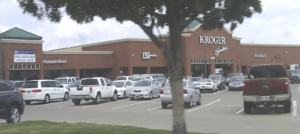
In the 1990s, Kroger continued to grow by buying more companies. They acquired Great Scott, Pay Less Food Markets, Owen's Market, JayC Food Stores, and Hilander Foods. In 1998, Kroger merged with Fred Meyer, which was the fifth-largest grocery company at the time. This merger also brought in Fred Meyer's stores like Ralphs, QFC, and Smith's.
Kroger also traded some of its stores in North Carolina for Harris Teeter stores in Virginia in 1999. Kroger would later buy Harris Teeter completely.
New Century, New Growth (2000s)
Kroger entered the Richmond, Virginia, market in 2000 by buying Hannaford stores. This helped them compete with other big grocery chains in the area. In 2001, Kroger bought Baker's Supermarkets. They also bought many former Albertsons stores in Houston in 2002.
In 2004, Kroger bought most of the old Thriftway stores in Cincinnati and turned them into Kroger stores. In 2007, Kroger acquired Scott's Food & Pharmacy and some former Farmer Jack locations. In 2008, Kroger started working with Murray's Cheese, a famous cheese shop from New York City. Now, many Kroger stores have Murray's Cheese counters.
Modern Era (2010s)
On July 9, 2013, Kroger announced it would buy Harris Teeter, a chain with 212 stores. This deal was worth $2.5 billion. This acquisition brought Kroger back to the Charlotte market after 25 years. It also helped Kroger start its "click-and-collect" program, where customers can order groceries online and pick them up.
In 2014, Kroger bought YOU Technology, a company that helped shoppers load digital coupons onto their loyalty cards. This company also used smart computer programs to offer personalized coupons.
In 2015, Kroger announced it would expand to Hawaii. They also bought the Hiller's Market chain in Michigan. In November 2015, Kroger merged with Roundy's, bringing stores like Pick 'n Save and Mariano's under Kroger's ownership. This marked Kroger's return to Wisconsin after 43 years.
In 2017, Kroger bought Murray's Cheese completely. Also in 2017, Kroger made a deal with the University of Kentucky. Their football stadium was renamed Kroger Field. In February 2018, Kroger announced it would sell most of its convenience stores, like Turkey Hill and Kwik Shop, to EG Group for $2.15 billion. Kroger kept its gas stations at its supermarkets.
In April 2018, Kroger planned to hire about 11,000 new employees. This brought the total number of people working for the company to nearly half a million. In May 2018, Kroger partnered with Ocado, an online supermarket company from the UK. This partnership helps Kroger improve its online ordering and home delivery services by building large, automated warehouses. The first of these opened in Ohio in April 2021.
Kroger also bought Home Chef, a meal kit delivery company, in May 2018. In June 2018, Kroger announced it would close its Kroger-branded stores in the Raleigh-Durham area of North Carolina. Some of these stores became Harris Teeter stores.
In 2019, Kroger started charging a small fee for cash back when customers used debit cards. They also partnered with the Plant Based Food Association to test plant-based meat options in some stores. In November 2019, Kroger updated its logo and added the "Fresh For Everyone" slogan.
Recent Events (2020s)
During the pandemic, Kroger gave its essential workers extra "hero pay" for a few months in 2020. However, when some cities passed laws requiring higher hazard pay, Kroger announced the closure of some stores in those cities. For example, they closed a Ralphs and a Food4Less in Long Beach, California, in early 2021.
In 2020, Kroger's online sales grew a lot, reaching over $10 billion each year. In 2021, Berkshire Hathaway started buying shares of Kroger and became one of its top shareholders.
In 2021, Kroger's Fred Meyer and QFC stores had their pharmacy records affected by a computer hack. In August 2021, Elaine Chao, a former U.S. Secretary of Labor and Transportation, joined Kroger's board of directors.
In September 2021, a shooting happened at a Kroger store in Collierville, Tennessee. One person died and 13 were hurt. The store was closed for a while afterward. Also in September 2021, Kroger updated its logo again to include a "Fresh Cart" symbol, which looks like a shopping cart with citrus slices.
In October 2021, Kroger expanded its online delivery service, Kroger Delivery, into South Florida. They plan to build more automated delivery centers across the U.S. On April 5, 2022, Kroger launched Kroger Restaurant Supply in Dallas-Ft. Worth. This new business delivers food to restaurants and bakeries.
On October 14, 2022, Kroger announced plans to merge with Albertsons in a $24.6 billion deal. However, this merger faced legal challenges from states like Washington and Colorado, and from the Federal Trade Commission (FTC). They worried the merger would lead to higher prices for shoppers and lower wages for workers. In December 2024, a U.S. judge blocked the proposed merger, saying it would be bad for customers and employees.
A survey in 2022 found that many Kroger workers faced financial struggles, with some experiencing food insecurity or homelessness. This happened while the CEO's pay increased.
Kroger's Business Numbers
| Year | Revenue (in millions US$) |
Net income (in millions US$) |
Total Assets (in millions US$) |
Price per Share (in US$) |
Employees | Supermarkets | C-stores | Jewelers | Total stores |
|---|---|---|---|---|---|---|---|---|---|
| 2006 | 60,553 | 958 | 20,482 | 6.94 | 290,000 | 2,507 | 791 | 428 | 3,726 |
| 2007 | 66,111 | 1,115 | 21,215 | 8.12 | 310,000 | 2,468 | 779 | 412 | 3,659 |
| 2008 | 70,336 | 1,209 | 22,293 | 8.13 | 323,000 | 2,486 | 782 | 394 | 3,662 |
| 2009 | 76,148 | 1,249 | 23,257 | 6.42 | 326,000 | 2,481 | 771 | 385 | 3,637 |
| 2010 | 76,609 | 70 | 23,126 | 7.12 | 334,000 | 2,468 | 777 | 374 | 3,619 |
| 2011 | 82,049 | 1,116 | 23,505 | 7.86 | 338,000 | 2,460 | 784 | 361 | 3,605 |
| 2012 | 90,269 | 602 | 23,476 | 8.63 | 339,000 | 2,435 | 791 | 348 | 3,574 |
| 2013 | 96,619 | 1,497 | 24,634 | 13.33 | 343,000 | 2,424 | 786 | 328 | 3,538 |
| 2014 | 98,375 | 1,519 | 29,281 | 21.97 | 375,000 | 2,640 | 786 | 320 | 3,746 |
| 2015 | 108,465 | 1,728 | 30,497 | 28.94 | 400,000 | 2,625 | 782 | 326 | 3,733 |
| 2016 | 109,830 | 2,039 | 33,897 | 24.20 | 431,000 | 2,778 | 784 | 323 | 3,885 |
| 2017 | 115,337 | 1,975 | 36,505 | 19.60 | 443,000 | 2,796 | 784 | 319 | 3,899 |
| 2018 | 122,662 | 1,907 | 37,197 | 20.01 | 449,000 | 2,782 | 782 | 274 | 3,838 |
| 2019 | 121,852 | 3,110 | 38,118 | 21.59 | 453,000 | 2,764 | 253 | 3,017 | |
| 2020 | 122,286 | 1,659 | 45,256 | 24.16 | 435,000 | 2,757 | 242 | 2,999 | |
| 2021 | 132,498 | 2,585 | 45,256 | 35.13 | 465,000 | ||||
| 2022 | 137,888 | 1,655 | 48,662 | 42.12 | 420,000 | ||||
| 2023 | 148,258 | 2,244 | 49,086 | 44.23 | 430,000 | ||||
| 2024 | 150,039 | 2,164 | 49,623 | 60.55 | 414,000 | ||||
| 2025 | 147,123 | 2,665 | 52,616 | 409,000 |
Kroger's Store Chains
Kroger operates many different store names across the country. Here are some of the main ones:
What is Kroger Marketplace?
Kroger Marketplace stores are very large supermarkets, like a mix of a grocery store and a department store. They were first introduced in 2004 in Ohio. These stores are similar to Kroger's Fred Meyer stores, which have many different departments.
Besides groceries, Kroger Marketplace stores usually have a Fred Meyer Jewelers, a Starbucks, and sections for toys, home items, and even furniture. They are much bigger than regular Kroger stores. The largest Kroger Marketplace ever built is in Centerville, Ohio, and is about 147,000 square feet.
Kroger has opened Marketplace stores in many states, including Ohio, Kentucky, Tennessee, Texas, Arkansas, Indiana, Virginia, Michigan, and Mississippi.
How Kroger Makes and Delivers Products
Getting Products to Stores
Kroger has its own ways of getting food and other products to its stores. They have different groups that handle buying and distributing items. Kroger also has its own trucks and trailers to deliver products. They even started testing driverless cars for grocery delivery in 2018 with a company called Nuro.
Kroger makes many of its own products, called "private label" brands. They have 33 factories that make about 40% of these products. Kroger has three main types of private label brands:
- Budget-friendly: These are basic products at the lowest prices.
- Comparable to national brands: These products are similar to well-known brands but offer better value.
- Premium/Organic: These are higher-quality, often organic, products.
Kroger's Own Brands
Kroger has a special collection of its own brands, called "Our Brands." These products make up more than 30% of all the items Kroger sells.
Banner Brand
These products have the Kroger name or the name of one of its other stores, like Ralphs or King Soopers. They are sold only in Kroger-owned stores and are known for being affordable. Many of Kroger's health and beauty products are also made by other companies but sold under Kroger's own brands.
Private Selection
Private Selection products are designed to be like fancy or gourmet brands. They are often seen as more upscale than the regular Kroger brand items.
Simple Truth
Simple Truth is Kroger's main brand for natural and organic foods. It started in 2012 and has grown very quickly. This brand was the first time Kroger made its own gluten-free products. Simple Truth products are even sold in China on Alibaba's Tmall website. By 2018, Simple Truth was making $2 billion in sales each year.
Smart Way
Smart Way is Kroger's newest budget-friendly brand, launched in 2022. It includes about 150 products that are priced very low.
Other Kroger Brands
Kroger also has many other brands for specific types of products, especially in stores like Fred Meyer that sell more than just food. Some of these brands include:
- Abound – natural pet food
- Bakery Fresh Goodness – fresh-baked foods
- Bloom Haus – floral arrangements
- Comforts – baby products
- Dip – a fashion brand
- Everyday Living – home goods
- HD Designs – fancy home goods
- HemisFares – imported foods
- Home Chef – meal kits
- Kroger Mercado – Hispanic-inspired foods
- Luvsome – pet food
- Murray's Cheese – special cheeses
- OfficeWorks – office supplies
- Pet Pride – pet food
Other Kroger Businesses
Kroger Pharmacies
Kroger used to own a separate chain of drugstores called SupeRx. In 1994, Kroger sold its drugstores to Revco. Today, Kroger has over 2,200 pharmacies, mostly inside its supermarkets. These pharmacies are a successful part of Kroger's business.
Gas Stations at Supermarkets
Since 1998, Kroger has added gas stations in the parking lots of its supermarkets. They also have some gas stations that are separate from the stores. As of 2022, Kroger had over 1,600 gas stations at its supermarkets.
In 2006, Kroger introduced a new logo for all its gas stations and former convenience stores. It's a diamond shape with a white map of the U.S. in the middle, surrounded by colored areas representing oceans and neighboring countries.
Kroger Personal Finance
Kroger Personal Finance started in 2007. It offers things like Kroger-branded credit cards, home loans, and different types of insurance (for pets, renters, and homes). In 2019, Kroger stopped accepting Visa credit cards at some of its stores because of high fees.
Kroger Wireless
Kroger Wireless is a phone service sold in Kroger stores. It uses the T-Mobile network. Customers can buy phones or use their own T-Mobile phones with Kroger Wireless.
84.51°
84.51° is a company owned by Kroger that uses data to understand what customers want. It was created in 2015.
Images for kids
-
A plaque remembering the Wright brothers in a Dayton, Ohio Kroger
-
Kroger Marketplace in Frisco, Texas (Store #035-00561) opened in 2010.
See also
 In Spanish: Kroger para niños
In Spanish: Kroger para niños
 | James Van Der Zee |
 | Alma Thomas |
 | Ellis Wilson |
 | Margaret Taylor-Burroughs |


